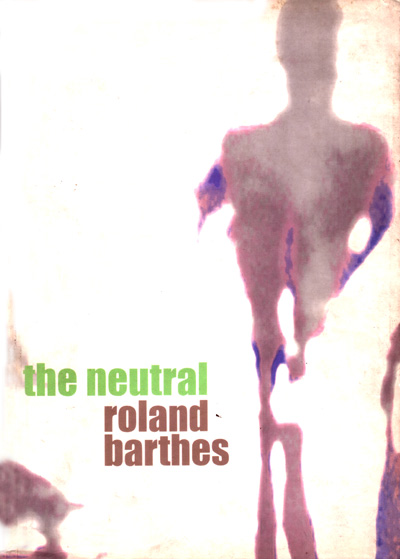The Neutral
Roland Barthes
7 x 9.5 inches, xxv + 282pp. 2006
ISBN : 9788170463061
Rs 475.00 (PB)
$0.00 (PB)
£0.00 (PB)
I define the Neutral as that which outplays the paradigm, or rather I call Neutral everything that baffles paradigm.’ With these words, Roland Barthes describes a concept that profoundly shaped his work and was the subject of a landmark series of lectures delivered in 1978 at the Collège de France, just two years before his death. Not published in France until 2002, and appearing in English for the first time, these creative and engaging lectures deepen our understanding of Roland Barthes’s intellectual itinerary and reveal his distinctive style as thinker and teacher.
The Neutral (le neuter), as Barthes describes it, escapes or undoes the paradigmatic binary oppositions that structure and produce meaning in Western thought and discourse. These binaries are found in all aspects of human society, ranging from language to sexuality to politics. For Barthes, the attempt to deconstruct or escape from these binaries has profound ethical, philosophical, and linguistic implications.
The Neutral is comprised of the written texts from which Barthes lectured and centres around 23 ‘figures,’ also referred to as ‘traits’ or ‘twinklings,’ that are possible embodiments of the Neutral (sleep, silence, tact, etc.) or of the anti-Neutral (anger, arrogance, conflict, etc.). His lectures draw on a diverse set of authors and intellectual traditions, including Lao-tzu, Tolstoy, German mysticism, classical philosophy, Rousseau, Baudelaire, Walter Benjamin, and John Cage. Barthes’s idiosyncratic approach to his subjects gives the lectures a playful, personal, and even joyous quality that enhances his rich insights.
In addition to his reflections on a variety of literary and scholarly works, Barthes’s personal convictions and the events of his life informed the course and content of the lectures. Most prominently, as Barthes admits, the recent death of his mother and the idea of mourning shape several of his lectures.
Roland Barthes was born in 1915 and studied French literature and classics at the University of Paris. After teaching French at universities in Romania and Egypt, he joined the Centre National de Recherche Scientifique, where he devoted himself to research in semiotics and lexicology. He was a professor at the Collège de France until his death in 1980.
One of the most influential critics and philosophers of the twentieth century. His works include Mythologies, S/Z, A Lover’s Discourse, and Camera Lucida.
Culture Studies
Philosophy

 Buy (PB)
Buy (PB)